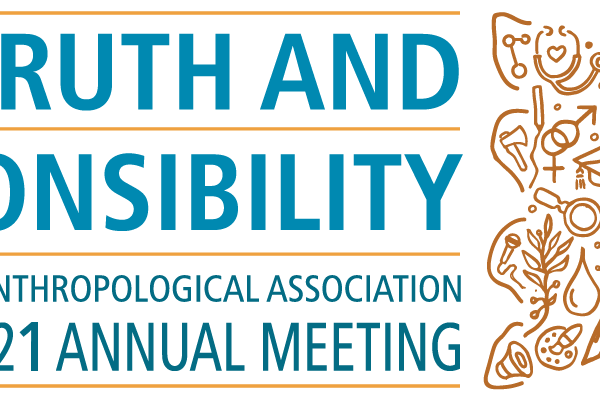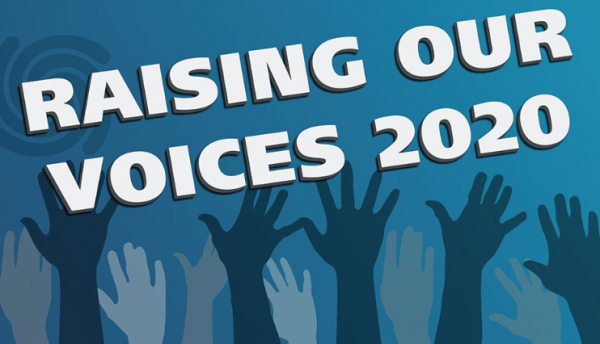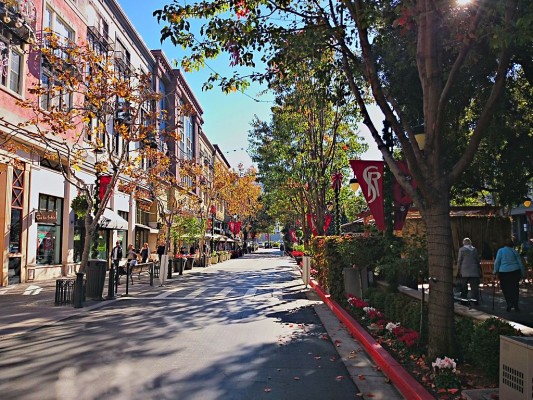November 20-24, 2019
Vancouver, British Columbia, CAN

Below you will find information about AES events, including our Business Meeting, a list of AES’s co-sponsored sessions, the AES graduate student meetup and a special Meet the Editors event sponsored by American Ethnologist. We look forward to seeing you in Vancouver!
American Ethnological Society (AES) Business Meeting
Saturday, November 23
12:15 PM – 1:45 PM
Location: Vancouver CC WEST, Room 214
This special event is open to all, especially current and prospective AES members. The main activity will be a celebration of the Sharon Stephens Book Prize winner and honorable mentions.
AES Co-Sponsored Sessions
(3-0600) Virtual Realities: Worldbuilding Beyond the Ethnographic Frame
Thursday November 21, 10:15 AM – 12:00 PM
Vancouver Convention Centre, West, Room 120
Sponsored by the Society for Visual Anthropology
Cosponsored with the American Ethnological Society
Presenters
William Lempert, Bowdoin College; Tom Boellstorff, University of California, Irvine; Haley Bryant, University of Toronto; Jeffrey Vadala, The College of New Jersey; Lisa Stefanoff, National Institute for Experimental Arts, School of Art & Design, University of New South Wales; Reese Muntean.
Abstract
In this roundtable we seek to bring together anthropologists engaged in virtual reality (VR) and 360 video to provoke cross-subdisciplinary conversations. We aim to collectively consider the ways in which these immersive media offer potentially generative ethnographic possibilities, while at the same time highlighting the seductive representational power of these charismatic technologies to produce false impressions of “embodied omniscience” (Messeri 2018). Often extolled as “empathy machines” by their proponents, we are interested in the ways in which a wide diversity of communities and media makers (including anthropologists) are employing these technologies to craft virtual realities that expand beyond some of the constraints of film and video, ceding control of framing-and sometimes even perspective-to audiences in favor of worldbuilding that fosters unique, individual, and intimate experiences. We consider VR and 360 from the perspectives of both a potential tool for conveying ethnographic and anthropological insight as well as a media generative of anthropological critique.
(3-0775) Consent and Vulnerability in Anthropological Practice
Thursday November 21, 2:00 PM – 3:45 PM
Vancouver Convention Centre, West, Room 121
Sponsored by the General Anthropology Division
Cosponsored with the American Ethnological Society
Presenters
Margot Weiss, Wesleyan University; Kisha Supernant, University of Alberta; Esther Anderson, University of Southern Queensland; Mythily Meher, The University of Auckland; Kersten Bergstrom, Texas A&M University.
Abstract
Conversations surrounding the MeToo movement have fostered broad public attentiveness to the nuances of consent, primarily in romantic and sexual relationships. That consent should be a willing and emphatic yes, rather than the absence of a no, has trickled out from contexts more attentive to consent’s role in ethical relational negotiations (like BDSM). As the notion of ‘consent’ evolves outside of academic discourse, how might we, as anthropologists, tend to the consent practices we enact as part of our profession – such as between fieldworker and informant, or between students and advisors? This panel brings together multiple international anthropologists and archaeologists currently working on issues of ethics and models of consent (USA, Australia, New Zealand, and Canada) to address timely disciplinary questions about consent, vulnerability, fieldwork, and gendered violence in anthropology. How do the conditions and culture of academia structure a culture of consent in ethnographic practice? What are the implications of an emphatic positive consent model for how anthropologists approach fieldwork and the institutional ethics process? How might ‘informed consent’ be negotiated by the anthropologist working with those with whom they have long histories and intimate familiarity—their own kin and/or community? Why might it be pertinent to conceive of consent as dynamic and multi-directional in fieldwork relationships? The roundtable discussion will revolve around these layered problems as they manifest for fieldworkers, for informants, or institutions. It will also encourage subsequent, related, discussions of vulnerability, violence, and strategy.
This forum is committed to revitalizing the discipline of anthropology by centering anti-colonial, queer and precarious perspectives, and will lay the ground for future collaborative work, such as further dissemination and updating of institutional sexual assault seminar materials, and considerations towards an upcoming edited volume on anthropology in the #MeToo era.
(3-0885) Opting Out: Women Evading Marriage Around the World (Part 1)
Thursday November 21, 2:00 PM – 3:45 PM
Vancouver Convention Centre, West, Room 203
Sponsored by the American Ethnological Society
Cosponsored with the Association for Feminist Anthropology
Presenters
Melanie Medeiros, SUNY Geneseo; Carla Freeman, Emory University; Kimberly Walters, California State University, Long Beach; Jacqueline Solway, University of Toronto; Shirin Gerami, University of Toronto.
Abstract
Something is happening to marriage around the world, and although anthropologists have been preoccupied with marriage as a social institution since our first forays into fieldwork, we are now scrambling to catch up on a plethora of new trends. This panel (Part 1 of 2) engages one of these trends in particular: women’s recent avoidance or outright rejection of marriage in places where it has long been obligatory.
Our intention in examining this seemingly prevalent phenomenon is three-fold: First, we see value in gathering diffuse ethnographic snapshots into a collection of case studies that speak to each other from otherwise largely incomparable contexts. Second, we are interested in whether we might observe patterns and glean insights into issues of broader anthropological concern, such as changing relationships between production and reproduction or economy and affect. Finally, by focusing squarely on shifts in marriage practices that suggest a rejection or avoidance of marriage itself, we want to ask whether such widespread but heretofore muted or barely visible dynamics present an epistemological and methodological challenge to anthropology, which may not yet be able to think outside of marriage—or sufficiently decenter it, even from analyses of its diminishing centrality. By focusing specifically on the dynamics of “opting out,” this panel open up the possibility for decentering marriage from anthropological analysis of social reproduction, and rethinking how anthropology might imagine its engagement with its subjects and objects without implicitly situating marriage itself as an idealized or normative referent.
Opting Out Part 1 includes paper presentations based on research in Brazil, Barbados, India, Botswana, and Iran. Each paper takes an ethnographic deep dive into examining the conditions that make this widespread — although locally variable — phenomenon possible, and perhaps even desirable. Whether considering the high rates of marriage dissolution amidst shifting dynamics of race and class in Brazil; the emergence of middle-class matrifocality in Barbados; the precarity of marriage within a globalizing Indian economy; changing notions of singleness in Botswana; or dramatic increases in (and moral panic about) White Marriage in Iran, these papers explore how new romantic desires, marital decisions, and norms of relatedness come into being. Collectively, these emerging trends challenge us, as anthropologists, to develop a new lens and language for apprehending them.
(3-0880) On Black Feminist Ethnography, Social Practice, and Collaboration: A Roundtable Discussion with Simone Leigh
Thursday November 21, 2:00 PM – 3:45 PM
Vancouver Convention Centre, West, Room 120
Sponsored by the American Ethnological Society
Cosponsored with the Society for The Anthropology of Work
Presenters
Vanessa Agard-Jones, Columbia University; Gina Athena Ulysse, Wesleyan University; Savannah Shange, University of California, Santa Cruz.
Abstract
This roundtable explores multimodal practices grounded in black feminist ethnography and epistemology as they relate to the 2019 conference themes of “Struggle, Collaboration, and Justice” within the varied institutional spaces black women traverse. In this session, a panel of scholars, who work across fields of the humanities and social sciences, will honor and discuss the work of visual artist-activist, Simone Leigh. From genres of sculpture to social practice, Leigh’s artistic work has deeply engaged ethnography, centering the meanings and political stakes of black women’s lived experiences. While her object-based work references art forms and materials of the African diaspora, her socially responsive projects orchestrate acts of radical care that invoke histories of healing and self-determination. Through a recent series of performance-based, collaborative actions—the Free People’s Medical Clinic (2014), The Waiting Room (2016), and “Black Women Artists for Black Lives Matter” (2016)—Leigh has carved transformative models for challenging institutional violence, uniquely poised to invigorate discussions on emergent approaches to public and multimodal anthropology. Aimee M. Cox will introduce Simone Leigh, who will present a talk on her socially engaged practice. In a call and response form, panelists Deborah A. Thomas, Vanessa Agard-Jones, Savannah Shange, and Gina Athena Ulysse will offer reflections on Leigh’s breadth of interdisciplinarity, infused with the sharing of their own ethnographically-oriented creative work. Through an intentionally designed conversation about black feminist praxis, this roundtable will advance understanding of the lived realities of black women under contemporary social conditions through anthropological modes of inquiry and extra-textual formats.
(3-1165) Opting Out: Women Evading Marriage Around the World (Part 2)
Thursday November 21, 4:15 PM – 6:00 PM
Vancouver Convention Centre, West, Room 203
Sponsored by the Association for Feminist Anthropology
Cosponsored by the American Ethnological Society
Presenters
Sarah Lamb, Brandeis University; Carla Jones, University of Colorado Boulder; Julia Pauli, University of Hamburg, Germany; Brady G’sell, University of Iowa.
Abstract
Something is happening to marriage around the world, and although anthropologists have been preoccupied with marriage as a social institution since our first forays into fieldwork, we are now scrambling to catch up on a plethora of new trends. This panel (Part 2 of 2) continues to engage one of these trends in particular: women’s recent avoidance or outright rejection of marriage in places where it has long been obligatory.
Our intention in examining this seemingly prevalent phenomenon is three-fold: First, we see value in gathering diffuse ethnographic snapshots into a collection of case studies that speak to each other from otherwise largely incomparable contexts. Second, we are interested in whether we might observe patterns and glean insights into issues of broader anthropological concern, such as changing relationships between production and reproduction or economy and affect. Finally, by focusing squarely on shifts in marriage practices that suggest a rejection or avoidance of marriage itself, we want to ask whether such widespread but heretofore muted or barely visible dynamics present an epistemological and methodological challenge to anthropology, which may not yet be able to think outside of marriage—or sufficiently decenter it, even from analyses of its diminishing centrality. By focusing specifically on the dynamics of “opting out,” this panel open up the possibility for decentering marriage from anthropological analysis of social reproduction, and rethinking how anthropology might imagine its engagement with its subjects and objects without implicitly situating marriage itself as an idealized or normative referent.
Opting Out Part 2 includes paper presentations based on research in India, Indonesia, Namibia, and South Africa. Whether considering women negotiating sexuality and singleness in West Bengal; activist Indonesian women reconfiguring marriage to suit their political goals; declining rates of marriage but not motherhood in Namibia; or women’s nationalist critiques of masculinity and marriage in South Africa, these papers point to a range of new possibilities for women to craft their romantic, sexual, and social lives, while drawing attention to the often fraught and ambivalent dimensions of women’s decision-making in these new playing fields.
(5-0125) Hate USA
Saturday November 23, 8:00 AM – 9:45 AM
Vancouver Convention Centre, West, Ballroom B
Sponsored by the Association for Political and Legal Anthropology
Cosponsored with the American Ethnological Society
Presenters
Lee D. Baker, Duke University; Alexander Hinton, Rutgers University; Nancy Scheper-Hughes, University of California, Berkeley; Norma Mendoza-Denton, University of California, Los Angeles; Miriam Ticktin, The New School for Social Research; Richard Wilson, University of Connecticut.
Abstract
Hate is on the rise in the U.S., part of a changing climate catalyzed in part by the 2016 election of Donald Trump and highlighted by events ranging from Charlottesville to the rise in hate crimes. Hate speech is now widespread, in public discourse and social media, and white supremacy and xenophobia have roared back in the political mainstream. The current President cultivates the politics of exclusion on a daily basis, whether it is advocating the building of a wall on the Southern border, excluding refugees from the Middle East, or opposing NFL players who kneel in protest at the shooting of African-Americans by the police. This panel assesses how anthropologists have documented and analyzed this recent upsurge in the politics of hatred and exclusion in the past three years. What intellectual tools does anthropology possess, both theoretically and empirically, to understand and explain this resurgence in nativism and chauvinism? How do previous anthropological studies of race, ethnicity and nationalism help us to understand the present context, and in what ways are they inadequate and in need of revision?
American Ethnologist Celebrates Peer Reviewers/ Meet the Editors
Cash Bar reception
Thursday November 21 8-10pm
Ocean View 1, Pan Pacific Vancouver Hotel
Raise a glass with American Ethnologist Editors Stacy Leigh Pigg and Michael Hathaway to celebrate the work of peer reviewers. A free drink goes to the first 50 AE peer reviewers (from recent years) who arrive; for the rest of you, it is a cash bar with BC craft beer and wine. Friends of AE and AES are, or course, welcome.
AES Graduate Student Meetup
There will be a graduate student meetup hosted by the grad student reps at the Morrissey Pub on Thursday, Nov. 21st from 8-10 pm. The address is 1227 Granville Street. Everyone welcome! Please reach out to Danielle with any questions, dlgood@utexas.edu.



